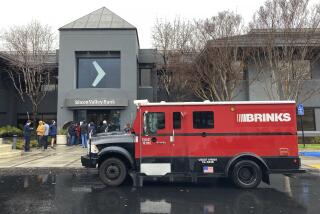President Signs $4-Billion Farm Credit Bailout, With Misgivings
- Share via
WASHINGTON — President Reagan signed the Farm Credit System rescue bill with misgivings Wednesday, saying that some provisions foster a tendency to put federal props under the agricultural economy.
Although finding fault with some aspects of the legislation to bail out as much as $4 billion in federally guaranteed bonds for the debt-ridden credit system, Reagan said the measure “ensures that the farm credit system will continue as a principal source of private credit to America’s farmers.”
During a bill-signing ceremony in the White House’s Roosevelt Room, the President said also that the legislation “implements many needed reforms to the system to ensure its long-term viability.”
Reagan painted a generally rosy picture of farming in his remarks but said that “many of America’s farmers are still suffering from the aftershocks of the runaway inflation of the ‘70s.”
$4.8 Billion in Losses
The Farm Credit System is a 70-year-old network of 37 banks and hundreds of local lending co-ops. It provides credit to one-third of the nation’s farm borrowers but has registered losses of $4.8 billion over the last two years.
The system’s problems are generally blamed on the crisis that swept rural America in the early 1980s, when land values plunged in the wake of falling crop prices and farmers were saddled with long-term loans at high interest rates.
Reagan used the bill-signing ceremony to criticize some provisions that he said encourage continued reliance by farmers on federal aid and are too expensive.
“Unfortunately, the Congress declined to require the system to provide as much self-help as we believe was appropriate and created new and potentially expensive federal support mechanisms for secondary markets for private sector agricultural loans,” he said.
The bill is expected to cost taxpayers up to $1.5 billion over five years. The Treasury eventually could have to pay the whole $4 billion plus interest if the system folds despite the rescue effort, but that is considered unlikely.
More to Read
Get the L.A. Times Politics newsletter
Deeply reported insights into legislation, politics and policy from Sacramento, Washington and beyond. In your inbox twice per week.
You may occasionally receive promotional content from the Los Angeles Times.










